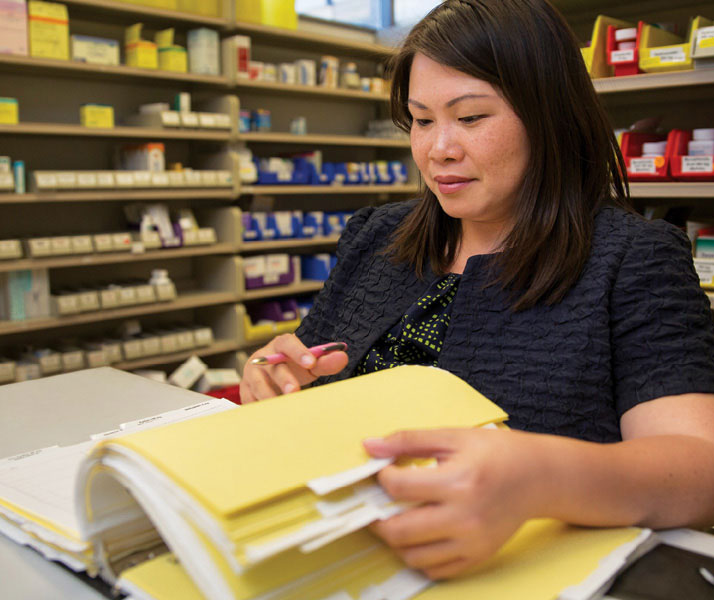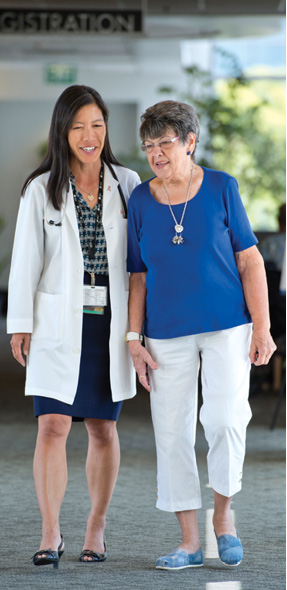
An extra layer of attention
Pharmacy program personalizes cancer care
Pedro Nieves takes 12 different medications every day. One to relieve swelling and bruising, one to regulate blood pressure, one to help manage his diabetes, and a blood thinner, among others.
From heart disease to renal failure, the petite, soft-spoken 71-year-old from Santa Clara County has had his share of health problems over the years and, in 2009, life got even more complicated. Nieves was diagnosed with late-stage kidney cancer. His daily medication regimen now also includes oral anti-cancer drugs — three pills in the morning and three in the afternoon.
“Sometimes I forget to take them all,” he says, as he gets settled into a chair for rehydration therapy at the UC Davis Comprehensive Cancer Center after a long day of running errands and helping out with his eight grandchildren. He says he feels lucky to have help from cancer center staff.
Nieves is one of many patients enrolled in the Medication Adherence Pilot Program, a specialty pharmacy program created in 2013 by the UC Davis Departments of Pharmacy and Internal Medicine, and the Division of Hematology and Oncology. The program is designed to ensure patients on any kind of oral anti-cancer drug stick to their treatment regimens to safely maximize their effectiveness and minimize or manage side effects.
Oral anti-cancer agents include targeted therapies (drugs designed to target specific genetic mutations), as well as oral chemotherapy prescriptions that target individual genes involved in tumor growth.
“The wider availability of orally bioavailable anti-cancer agents has increased the need for better coordinated cancer care,” says Primo Lara, a medical oncologist and the cancer center’s associate director for translational research. “These oral agents span the spectrum of hormonal therapies, molecularly targeted therapies and cytotoxic chemotherapy.”
In addition, many traditional chemotherapy drugs are being developed in oral formulations, allowing for continuous exposure of the drug in the patient over time, which can be more effective and less toxic, says Ted Wun, a medical oncologist and chief of the Division of Hematology and Oncology.
Lara prescribed an oral drug for Nieves because it represents “state-of-the-art” care for his patient. Oral therapy also has the advantage of being more convenient and less invasive.
When oral treatment is prescribed exclusively, patients require fewer office visits and may have a greater sense of control over their treatment.
But along with the benefits, the drugs pose new challenges.
Unlike traditional drug therapy, which takes place in special infusion centers with intensive nursing care, patients taking oral anti-cancer drugs without the information or support they need may experience potentially life-threatening side effects.
While on the drug sunitinib, Nieves was at risk for a host of serious side effects — an uneven heartbeat, seizures, liver problems — and needed careful monitoring, for example.
“Patients are monitored when they’re here, but when they go home, they are harder to monitor,” says Josephine Lai, the cancer center’s pharmacy supervisor, who has been assessing adherence rates of anti-cancer drugs since 2012. She says harsh side effects are one of the primary reasons patients often stop taking the drugs.
Having endured extreme fatigue, vomiting and diarrhea so severe he’s needed multiple sessions of intravenous rehydration, Nieves admits he’s skipped some pills.
That can lead to other problems, says Wun. Stopping the medication or not following the directions correctly can affect treatment efficacy, produce misleading results and cause higher mortality.
“When patients don’t respond to the drug, we wonder if they’re taking it. Intravenous administration means we know they got the drug, but with oral drugs we don’t typically measure drug levels in the blood, so we just have to take it on faith,” he says. “It’s important we have confidence the drug is being taken.”
Through education, monitoring and one-on-one counseling, the specialty pharmacy program helps oncologists determine the effectiveness of prescribed cancer treatments. For Nieves, it has helped him stick to his drug regimen and manage debilitating side effects.
“For the past year, they’ve been calling me from the pharmacy,” he says, smiling. “They want to know how I’m feeling and if I’m taking my pills correctly.”
After sunitinib stopped working, Nieves was prescribed other targeted therapies. He says the phone calls have been a perfect way for him to communicate new health issues that come up.
“They put me on 10 mg of axitinib recently, and the diarrhea was intolerable,” he says. “I told the pharmacist on the phone, and they immediately talked to my doctor. The dose was changed.”
The program gives patients “a consistent way to complain about their side effects,” says Laura Brennan, a cancer center nurse practitioner who provides one-on-one patient counseling. Patients are often hesitant to talk about side effects, she says, because they think it’s a necessary part of the cancer treatment, but “we want them to tell us because there are ways we can make it better.”
Patients enrolled in the program can make an appointment with a pharmacist or a nurse practitioner anytime they have side effects or a question about their drug regimen. In addition to calling regularly to monitor patients’ progress and notify oncologists of any issues, pharmacists go over regimens and offer practical tips, such as how to maintain a medication calendar or handle a missed dose.
“Just knowing someone is checking up on me is comforting,” says Nanette Osborn, who has metastatic breast cancer. Osborn, 80, lives in Pollock Pines and is treated exclusively with oral chemotherapy. “They ask me how many pills I have left, how soon I’ll be back to UC Davis to get more, and if I can’t come down, they arrange for the drugs to be mailed.”
Living far from the cancer center, Osborn says she appreciates the constant connection she has to her UC Davis care team through the program, and her oncologist Helen Chew welcomes the extra monitoring.
“Because we have more oral treatment options for a variety of tumors, compared to a decade ago, it’s helpful to have a program that contacts patients to review the correct dosing and reinforce important information about the expected side effects,” she says.
Nieves and Osborn were two of 44 patients enrolled in the pilot program, and preliminary assessments show 92 percent of participants adhered to their regimens. Today, 80 cancer center patients are enrolled and, beginning this fall, a full-time pharmacist will operate the program, which will be offered to all UC Davis cancer patients.

